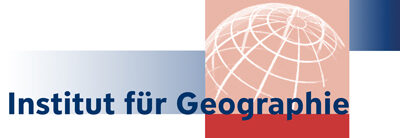Andreas Neuner
Andreas Neuner
Curriculum Vitae
| since 2023 | Research associate and doctoral candidate at the Institute of Geography, FAU Erlangen-Nürnberg, in the working group Digital Health Geographies. |
| 2021-2023 | Master of Arts passed with distinction in the degree programme Cultural Geography at the Faculty of Sciences with the specialisation City Research and Regional Development, Friedrich-Alexander-Universität Erlangen-Nürnberg. |
| 2018-2021 | Aerial Image Analyst/Project Manager, Luftbilddatenbank Dr. Carls GmbH, Estenfeld |
| 2014-2018 | Bachelor of Science in Human Geography, Julius-Maximilians-Universität Würzburg |
Publications & Presentations
Publications
- Kremer D., Neuner A., Jelinski S., Stadlmeier A., Schlieder C., Walker B. (2023):
Tracing Individual Experiences of Everyday Greenness: Initial Results from the SpaceLog Mobile App.
GI_Forum 2023 11 (2): 47-58.
https://doi.org/10.1553/giscience2023_02_s47
Presentations
- 02.05.2024: Networking Event “Verbundprojekt Klimawandel und Gesundheit”, Munich
Resilienz durch Kulturlandschaft im Klimawandel (REKKE) (Poster)
(with Andreas Wagner, Dominik Kremer, Matthias Braun, Sarah Jelinski, Thomas Mölg, Christian Sommer, Anna Stadlmeier, Sibille Wehrmann and Blake Walker) - 13.12.2023: Institute Colloquium, Erlangen
Alltägliche urbane Green Spaces und mentales Wohlbefinden - 22.09.2023: German Congress of Geography 2023, Frankfurt
Herausforderungen der Transformation zur Klimaresilienz: Erste Befunde aus Expert*inneninterviews in der Region Oberfranken-West
(with Dominik Kremer, Anna Stadlmeier and Blake Walker) - 04.07.2023: GI_Salzburg 2023, Salzburg
Tracing individual experiences of everyday greenness: Initial results from the SpaceLog mobile app
(with Dominik Kremer, Sarah Jelinski, Anna Stadlmeier, Christoph Schlieder and Blake Walker)
Teaching
Co-teaching in “Lehrforschung Master: Kulturlandschaften im Klimawandel” (ws 23/24, ss 24)
Research
- Climate Adaptation, Networks and Resilience
- Health Geography
- Mental Health
REKKE – Resilienz durch Kulturlandschaft im Klimawandel
The effects of climate change in Bavaria imply a future trend towards longer-lasting heatwaves in the summer, with temperatures reaching well above 40°C in some cases. Consequently, cultural landscapes face significant challenges in their resilience- and health-promoting roles for the population. This contains not only the loss of familiar aesthetic qualities but also specific limitations of places of relaxation, social participation and physical activity. These effects influence the usability of the balcony at home as well as summer outdoor events or the weekly walking group in nearby forests. The consequences of climate change particularly impact vulnerable population groups, who already have limited access to health-promoting elements within cultural landscapes.
IsoGW – Isoscapes Groundwater
Iscoscapes Groundwater
Databases that record isotope ratios in precipitation have long existed. The IsoGW project, led by the GeoZentrum Nordbayern at FAU, will now create such a digital directory for groundwater in Germany. The data from this project will be freely available to the public as an interactive map. This database will make it significantly easier to observe the conditions in groundwater itself and external influences.
For example, how sustainable are wells that often draw water for many people and numerous businesses? Do the amounts of newly formed and extracted water balance each other out, or is more water being pumped to the surface than is being replenished? Is the well possibly tapping into ancient water reserves that were formed thousands of years ago and are being replaced much more slowly than they are being extracted? How is climate change affecting the amount of water underground?
Research groups, authorities, and businesses will be able to answer these and other questions more quickly and easily with the help of the database created by IsoGW. The Federal Ministry of Education and Research (BMBF) is funding the IsoGW joint project as part of the “LURCH” funding measure within the federal program “Wasser: N.” Wasser: N is part of the BMBF strategy “Research for Sustainability” (FONA).

